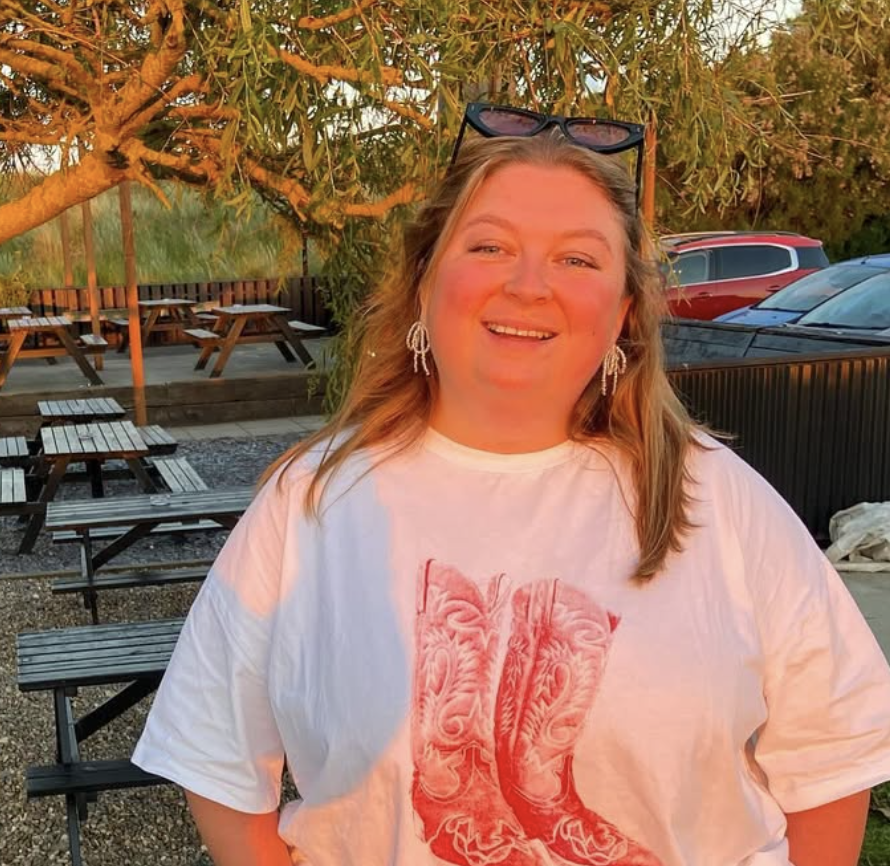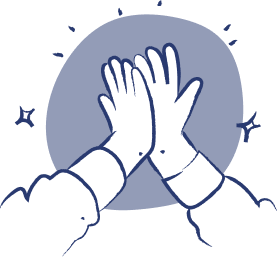Bickerstaff Brainstem Encephalitis – Rebecca’s Story

Rebecca was diagnosed with Bickerstaff brainstem encephalitis in November 2022 when she returned from a sabbatical in Bali.
Lead up
In November 2022, I’d never experienced any real health issues and had always been incredibly energetic. I was 29 years old and had spent most of my 20s travelling, socialising and working in London. However, this all changed following a sabbatical in Bali.
I’d chosen to go to Bali following the death of my father, which had been incredibly traumatic for my family. I spent a week at a yoga retreat on Nusa Lembongan, explored northern Bali and then a friend joined me before continuing to Komodo Island. A day before our Komodo trip, I suffered awful food poisoning. I didn’t think anything of it really, and once I was better, I pushed myself to continue with normal holiday activities, despite occasionally feeling a bit faint. About a week after the food poisoning, I was back in the UK and did my first week back at work.
Symtoms
One night, around 2 weeks after the food poisoning, I began to feel suddenly dizzy and sick. I remember feeling like something was very wrong, even though these symptoms did not seem serious at the time. I took the next day off work and spent the day in bed, barely able to walk to the loo without intense feelings of vertigo – my vision was blurred, balance was off, and I felt incredibly nauseous. It got to the point where I was too weak to lift myself out of bed and could no longer walk, as my legs felt strange.
I was taken to the hospital by ambulance at 1 am and can remember lying in A&E very scared and ill, with lots of beeping and voices all around me. My vision faded at one point, and after that, everything is entirely blank. I was quickly taken to the Intensive Care Unit (ICU). There was much worry about a tropical disease causing my symptoms, hence the speed of my admission.
What happened after this, I have to go by what my family have told me, as I had fallen unconscious and then was placed into a medically induced coma. I also have a diary that was written in by the nurses in the ICU who had monitored my breathing and looked after me. My mother said it was very upsetting, as before I had been sedated, I didn’t know who she was and was incredibly distressed. I had also been seizing, and my body seemed to be twitching on its own accord. Thankfully, I don’t have any memory of this.
Diagnosis
When I woke up, it was 5 weeks later, and I was in a different ICU surrounded by doctors peering down at me, which was very frightening. It felt as though someone was turning up the volume gradually in my ears as I gradually came to – which I now think was me being brought out of the coma. I didn’t know where I was, and I couldn’t speak due to the tracheostomy I’d had to support my breathing. I think I communicated by mouthing to them and gesturing. My vision also seemed to be poor following waking up, and initially, I couldn’t move my eyes at all or complete any of the tests my neurologists tried with me. However, this seemed to improve after a few days, and soon I was trying to practice my writing on a small white board that my aunt gave me. It was a huge relief to see my family, although I hadn’t seen them in over a month; they had been by my side every single day while I was in the coma.
What I couldn’t communicate at the time was the intense dreams and nightmares I’d had during the coma – it felt as though I’d been trapped in my brain for weeks on end. It was a relief to know what I was seeing was finally real. I’d had lots of dreams about the hospital I was in, and I’d also believed lots of incorrect things that had happened since being sedated. I had to go through a list of things that had happened that my family could tick as ‘real’ or ‘not real’. At one point, I had believed I was on a ship, gotten sea-sick, and then was sick in real life – the nurses couldn’t work out why I’d been unwell! A lot of the dreams, however, had been terrifying; this took some time to come to terms with.
Once fully awake and weened off some of the stronger sedatives, I had been told what had happened and was very tearful. It had taken weeks to diagnose me, with theories first starting with a tropical disease and then progressing to meningitis. I’d had multiple scans, tests and lumbar punctures with nothing seemingly wrong with me, though my brain stem had lit up on the scans. The cause of my symptoms seemed to be unknown. Apparently, I had been brought out of the coma multiple times over the weeks, but I hadn’t responded at all or had – but very poorly and had continued to seize. My family and friends were at a loss to what was going on and the weeks had gone by with little progress.
Then, they discovered I had Campylobacter in my stomach, a common bacterium caused by contaminated food – no doubt a remnant of my Bali food poisoning. It was deduced that this had sparked Bickerstaff Brainstem Encephalitis (BBE) – a rare variant of Gullain-Barré syndrome (GBS). BBE is a rare, autoimmune disease of the peripheral and central nervous system (ie, brainstem). It can cause blurred vision, ataxia, and changes in responsiveness. After this, I was transferred to the special neurology hospital.
I was in the ICU for around 10 days after waking up and had to be carefully monitored. I couldn’t sit up by myself or use my hands, and I couldn’t stand up or walk; therefore, I was confined to my hospital bed. I had so many wires coming out of me that it was pretty challenging to get to sleep, as I worried I would dislodge something. Luckily, an excellent team of physios and occupational therapists were with me from the moment I was strong enough, and they promised I would be on my feet again. I also had to work with my Ear, Nose and Throat specialist to get myself back to breathing independently without my tracheostomy tube – this also meant I could finally eat and drink. My first drink was an Orangina, which tasted like heaven.
During this time, I was utterly distraught at my lack of mobility, as it felt as though I’d gone from a very active young person, to being reliant on a hoist that I was strapped into to get me out of bed and into my chair so I could feel like I was less bed-bound – I spent a lot of these first few days in tears. But when my throat tube was removed, I was able to finally chat to my family and also to the ICU nurses, who were lovely, and gave me an iPad to watch Miranda on!
Aftermath and recovery
Once I was well enough, I was placed in an open neuro ward where my friends could visit me. Something I want to highlight is the hair loss I experienced while in the hospital – as I had been lying down for so long, my hair had gotten matted. I think due to the EEGs (electroencephalograms) I’d had, the glue used to secure electrodes to my head had caused large clumps. The care I’d received for my body was the most important thing, but most of my hair had to be ripped out to untangle it. This affected my feelings about getting back to normal – looking back now, it wasn’t a big deal compared to what could have happened to me, but at the time, it was traumatising to lose my long hair when my body also felt unsafe and different.
After 2 weeks on the ward, I was discharged and sent back to my family home, and then the recovery really began. I still couldn’t walk well and could only manage short distances, with the support of another person. I also couldn’t do basic things like climbing stairs or making my bed, as my legs and hands were so weak. It took around 2 months to get enough strength back to walk more independently for longer stretches. This was helped by having a physio to help me get back to normal. I’d additionally had a blood clot in my arm and a pulmonary embolism whilst in the coma, so I had weekly blood tests for my blood-thinning medication – something which continued for over a year after discharge. Being at home with family and friends helped me overcome the mental and physical challenges of recovery.
Today, I am back in London and living independently, seemingly as if nothing ever physically happened! For around 9 months after discharge, I did suffer from daily dizziness, especially when lying down to sleep. I also periodically really worried about my eyes and any residual blurriness, though many eye tests have reassured me that nothing with my eyes was impacted. These are things that my GP referred to as ‘post-encephalitic symptoms’.
Despite all that happened to me, I feel like a perfectly normal 31-year-old!
I hope this helps others who are currently facing or recovering from BBE. The emotional side of recovery has been the hardest bit for me, as you do worry about recurrences. I have at times been very upset about what happened to me; however, mostly now I feel incredibly grateful for the care I received and relieved that I have done so well despite the trauma I went through. Two and a half years on, I’ve managed to do challenging hikes in Canada on another sabbatical! So please do believe it does get better.
Story published September 2025
Please contact us for more information about encephalitis.
Get help
Our support team are available from 9am to 5pm (GMT), Monday to Thursday, and 9am to 4.30pm (GMT) on Fridays.
To get in touch, simply call +44(0)1653 699599.
Contact our helpline
